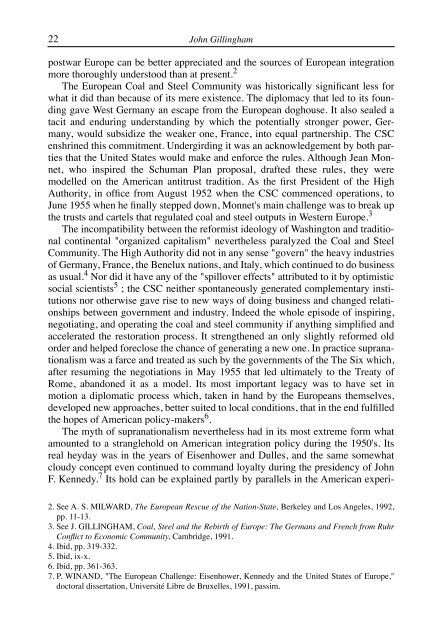number 1 - Centre d'études et de recherches européennes Robert ...
number 1 - Centre d'études et de recherches européennes Robert ...
number 1 - Centre d'études et de recherches européennes Robert ...
You also want an ePaper? Increase the reach of your titles
YUMPU automatically turns print PDFs into web optimized ePapers that Google loves.
22<br />
John Gillingham<br />
postwar Europe can be b<strong>et</strong>ter appreciated and the sources of European integration<br />
more thoroughly un<strong>de</strong>rstood than at present. 2<br />
The European Coal and Steel Community was historically significant less for<br />
what it did than because of its mere existence. The diplomacy that led to its founding<br />
gave West Germany an escape from the European doghouse. It also sealed a<br />
tacit and enduring un<strong>de</strong>rstanding by which the potentially stronger power, Germany,<br />
would subsidize the weaker one, France, into equal partnership. The CSC<br />
enshrined this commitment. Un<strong>de</strong>rgirding it was an acknowledgement by both parties<br />
that the United States would make and enforce the rules. Although Jean Monn<strong>et</strong>,<br />
who inspired the Schuman Plan proposal, drafted these rules, they were<br />
mo<strong>de</strong>lled on the American antitrust tradition. As the first Presi<strong>de</strong>nt of the High<br />
Authority, in office from August 1952 when the CSC commenced operations, to<br />
June 1955 when he finally stepped down, Monn<strong>et</strong>'s main challenge was to break up<br />
the trusts and cartels that regulated coal and steel outputs in Western Europe. 3<br />
The incompatibility b<strong>et</strong>ween the reformist i<strong>de</strong>ology of Washington and traditional<br />
continental "organized capitalism" nevertheless paralyzed the Coal and Steel<br />
Community. The High Authority did not in any sense "govern" the heavy industries<br />
of Germany, France, the Benelux nations, and Italy, which continued to do business<br />
as usual. 4 Nor did it have any of the "spillover effects" attributed to it by optimistic<br />
social scientists 5 ; the CSC neither spontaneously generated complementary institutions<br />
nor otherwise gave rise to new ways of doing business and changed relationships<br />
b<strong>et</strong>ween government and industry. In<strong>de</strong>ed the whole episo<strong>de</strong> of inspiring,<br />
negotiating, and operating the coal and steel community if anything simplified and<br />
accelerated the restoration process. It strengthened an only slightly reformed old<br />
or<strong>de</strong>r and helped foreclose the chance of generating a new one. In practice supranationalism<br />
was a farce and treated as such by the governments of the The Six which,<br />
after resuming the negotiations in May 1955 that led ultimately to the Treaty of<br />
Rome, abandoned it as a mo<strong>de</strong>l. Its most important legacy was to have s<strong>et</strong> in<br />
motion a diplomatic process which, taken in hand by the Europeans themselves,<br />
<strong>de</strong>veloped new approaches, b<strong>et</strong>ter suited to local conditions, that in the end fulfilled<br />
the hopes of American policy-makers 6 .<br />
The myth of supranationalism nevertheless had in its most extreme form what<br />
amounted to a stranglehold on American integration policy during the 1950's. Its<br />
real heyday was in the years of Eisenhower and Dulles, and the same somewhat<br />
cloudy concept even continued to command loyalty during the presi<strong>de</strong>ncy of John<br />
F. Kennedy. 7 Its hold can be explained partly by parallels in the American experi-<br />
2. See A. S. MILWARD, The European Rescue of the Nation-State, Berkeley and Los Angeles, 1992,<br />
pp. 11-13.<br />
3. See J. GILLINGHAM, Coal, Steel and the Rebirth of Europe: The Germans and French from Ruhr<br />
Conflict to Economic Community, Cambridge, 1991.<br />
4. Ibid, pp. 319-332.<br />
5. Ibid, ix-x.<br />
6. Ibid, pp. 361-363.<br />
7. P. WINAND, "The European Challenge: Eisenhower, Kennedy and the United States of Europe,"<br />
doctoral dissertation, Université Libre <strong>de</strong> Bruxelles, 1991, passim.

















